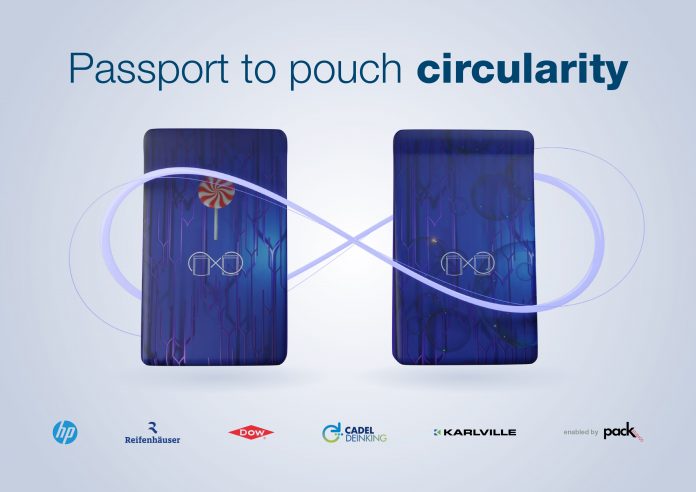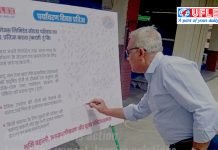Building on the success of the first-of-its-kind pouch-to-pouch mechanical recycling concept, Dow Packaging and Specialty Plastics, a business unit of Dow, has joined hands with HP Indigo, Reifenhäuser, Cadel Deinking, and Karlville, to implement the application of a digital product passport using the R-Cycle database.
The R-Cycle is a cross-company initiative to develop an open and globally applicable traceability standard for sustainable plastic packaging.
Circular economy needs information
For a functioning circular economy for plastic packaging, two prerequisites are needed – The first is fully recyclable packaging that uses the highest possible recycled content. The pouch-to-pouch recycling concept has impressively demonstrated this requirement. Secondly, for such a material cycle to work under real conditions for post-consumer waste streams, the waste sorting and recycling process must improve fundamentally.
In a complex waste stream consisting of a wide variety of products, it is not yet possible to separate by type of plastic, ingredients, and use of flexible packaging. For example, for food, medicines, or chemicals. These current recycling constraints result in a low-quality mixture of different plastics that can only be used in recycling to a very limited extent. As a rule, they end up in thermal recycling or, at best, downcycling. A key reason for this is a lack of information to sort plastic waste into unmixed fractions and thus turn them into valuable raw materials for new products.
Passport to pouch circularity
R-Cycle provides exactly this information, and the best part is the information already exists. Production and ERP systems capture, write and analyze all conceivable information related to a package. All that needs to be done is to aggregate the relevant information and transport it along the value chain. The vehicle for this is the so-called digital product passport. In the pouch-to-pouch recycling concept, all recycling-relevant information about the packaging is recorded in a standardized data record — that is, among other things, the type of plastic, printing color, or recycled content – and can be retrieved via a marker.
In this way, industrial sorting plants can access the product passports of the packaging and form waste fractions that are sorted by type accordingly. Thanks to the digital product passport, high-quality and transparent streams of recyclable materials can be created, which can be recycled accordingly for applications of equal or higher value.
Benedikt Brenken, director R-Cycle, explains, “The digital product passport is a powerful tool to enable an efficient and data-based circular economy. R-Cycle is thus exploiting the potential of digitalization, as politically demanded by the European Union’s circular economy action plan. Most importantly, we use an open and interoperable infrastructure based on proven standards that is accessible to every market participant.”
Romain Cazenave, EMEA Marketing director at Dow Packaging & Specialty Plastics, said, “In our efforts to drive the adoption of PE-rich mono-material pouches designed for recyclability, it is key to retain the quality of flexible plastic packaging throughout the value chain into the next applications after recycling. The digital product passport by R-Cycle provides seamless documentation of all necessary data of the PE-rich pouch with recycled content along its lifecycle. This quality information is crucial to help obtain high-quality recyclates and to accelerate our journey to achieve the circular economy of plastic packaging. Through Pack Studios, Dow is contributing to industry-scale testing and production capabilities to accelerate the development of such projects globally.”
R-Cycle presented these and other application examples of the digital product passport this year for the first time at K 2022.










